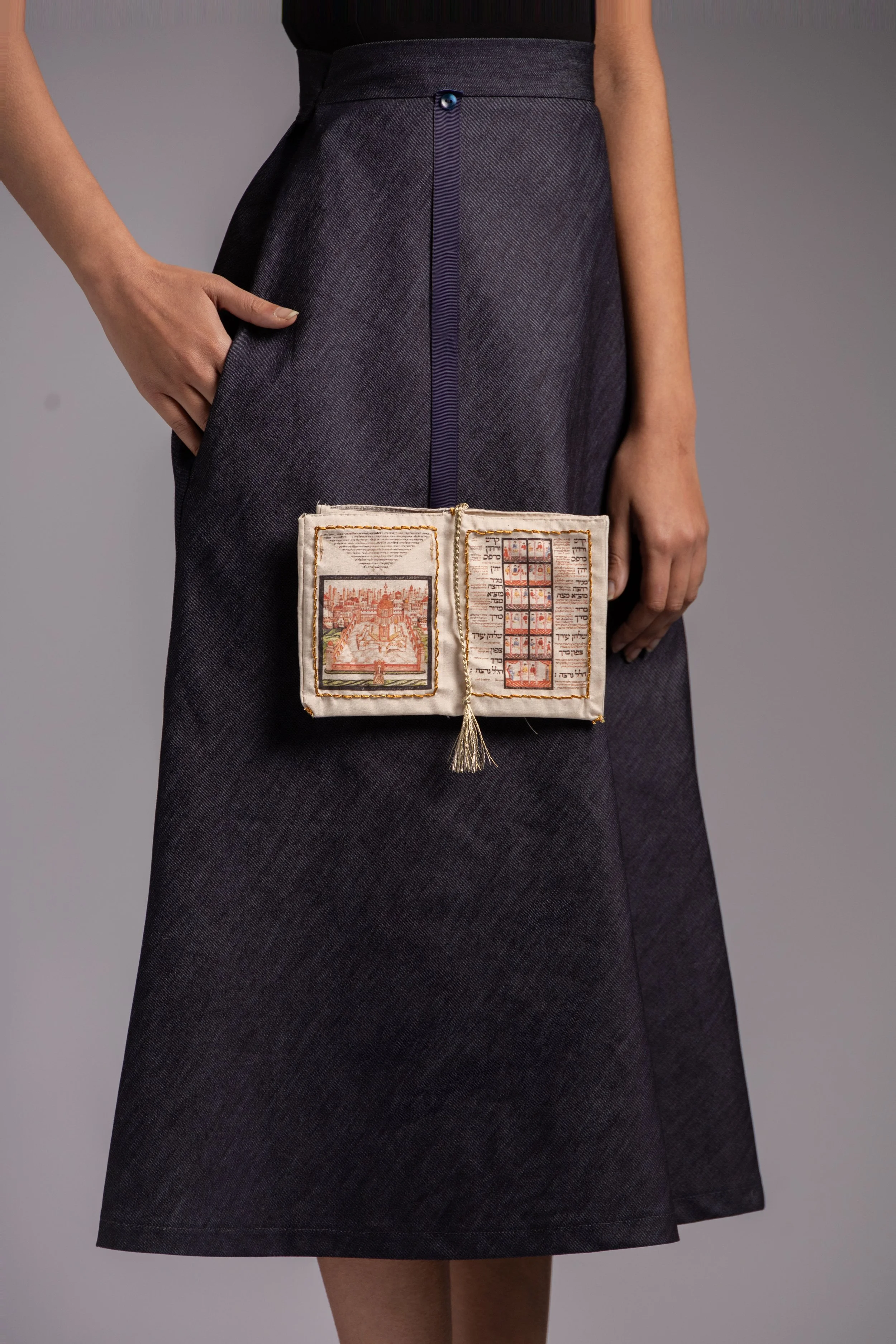

The 'Ella' Skirt
This timeless A-line denim skirt effortlessly combines style and practicality. It features convenient side pockets and a secure back zipper for easy wear. Crafted from high-quality fabric, this skirt offers both durability and elegance, making it a long-lasting wardrobe staple.
What makes this skirt truly unique is its detachable book detail, printed on calico fabric. If someone asks about the book on your skirt, simply unbutton it and share its story. Inspired by Ella Kagan, a Refusenik and the founder of the Shalom Education Center, this skirt is a conversation starter that brings personal history and style together.
About The Design
Ella's skirt is crafted from denim, a material that once symbolized the allure of the West during the Soviet Union’s Brezhnev era. In the 1970s, denim was not just fabric—it was aspiration. Hard to find and traded only on the black market, jeans carried stories of resistance and hope. Visitors from abroad often brought them as gifts for refuseniks, who could sell them to support themselves amidst the challenges of their struggle.
When I asked Ella what she brought with her when leaving the Soviet Union, she spoke not of material possessions but of books: her grandfather’s Bible, an old edition of Mikhail Lermontov’s poetry, and the books of her husband, Pavel. These treasures represented her roots and identity—what she truly valued in a world of uncertainty.
Inspired by Ella’s connection to books and her Jewish heritage, I designed a unique element for her skirt: a fabric book. It is printed on calico fabric, chosen to evoke the texture of aged paper. It reflects the enduring culture of the Jewish people—known as the ‘people of the book’—who have carried their stories, prayer books, and humor across borders, preserving their identity through exile and change.
The ‘pages’ of this fabric book tell Ella’s story:
The First Page: A reproduction of an 18th-century Jewish Passover Haggadah, recounting the plagues of Egypt. Like the biblical story, the plight of the refuseniks was one of being trapped—neither free to stay nor leave, caught in the machinery of oppression.
The Second Page: Lermontov's poem The Sail, a favourite of Ella’s, symbolizes her yearning for new horizons and challenges.
The Third Page: A collection of absurd questions from the immigration forms, highlighting the Kafkaesque bureaucracy Ella faced. Questions like "Have you trained child soldiers?" or "Are you a communist?" underscore the surreal and often laughable obstacles she encountered.
The skirt is not merely a garment—it is a statement. By placing her story and heritage visibly on her lap, Ella asserts, ‘I am not hiding my life or my faith’. The ‘book’ on the skirt is functional, designed to be unbuttoned for reading or washing, emphasizing its tactile and living quality.
Credits: Maryna Novohorodska – Graphic Design for the Book.
The 'Ella' Skirt
This timeless A-line denim skirt effortlessly combines style and practicality. It features convenient side pockets and a secure back zipper for easy wear. Crafted from high-quality fabric, this skirt offers both durability and elegance, making it a long-lasting wardrobe staple.
What makes this skirt truly unique is its detachable book detail, printed on calico fabric. If someone asks about the book on your skirt, simply unbutton it and share its story. Inspired by Ella Kagan, a Refusenik and the founder of the Shalom Education Center, this skirt is a conversation starter that brings personal history and style together.
About The Design
Ella's skirt is crafted from denim, a material that once symbolized the allure of the West during the Soviet Union’s Brezhnev era. In the 1970s, denim was not just fabric—it was aspiration. Hard to find and traded only on the black market, jeans carried stories of resistance and hope. Visitors from abroad often brought them as gifts for refuseniks, who could sell them to support themselves amidst the challenges of their struggle.
When I asked Ella what she brought with her when leaving the Soviet Union, she spoke not of material possessions but of books: her grandfather’s Bible, an old edition of Mikhail Lermontov’s poetry, and the books of her husband, Pavel. These treasures represented her roots and identity—what she truly valued in a world of uncertainty.
Inspired by Ella’s connection to books and her Jewish heritage, I designed a unique element for her skirt: a fabric book. It is printed on calico fabric, chosen to evoke the texture of aged paper. It reflects the enduring culture of the Jewish people—known as the ‘people of the book’—who have carried their stories, prayer books, and humor across borders, preserving their identity through exile and change.
The ‘pages’ of this fabric book tell Ella’s story:
The First Page: A reproduction of an 18th-century Jewish Passover Haggadah, recounting the plagues of Egypt. Like the biblical story, the plight of the refuseniks was one of being trapped—neither free to stay nor leave, caught in the machinery of oppression.
The Second Page: Lermontov's poem The Sail, a favourite of Ella’s, symbolizes her yearning for new horizons and challenges.
The Third Page: A collection of absurd questions from the immigration forms, highlighting the Kafkaesque bureaucracy Ella faced. Questions like "Have you trained child soldiers?" or "Are you a communist?" underscore the surreal and often laughable obstacles she encountered.
The skirt is not merely a garment—it is a statement. By placing her story and heritage visibly on her lap, Ella asserts, ‘I am not hiding my life or my faith’. The ‘book’ on the skirt is functional, designed to be unbuttoned for reading or washing, emphasizing its tactile and living quality.
Credits: Maryna Novohorodska – Graphic Design for the Book.